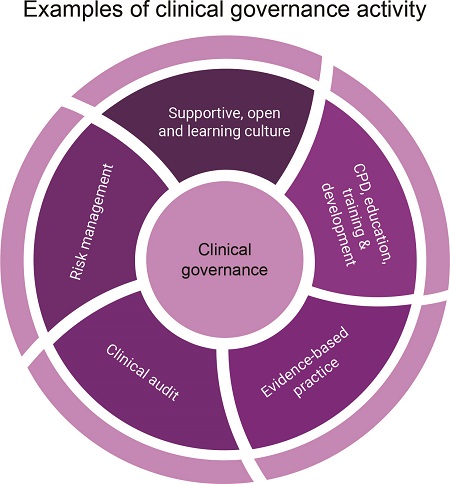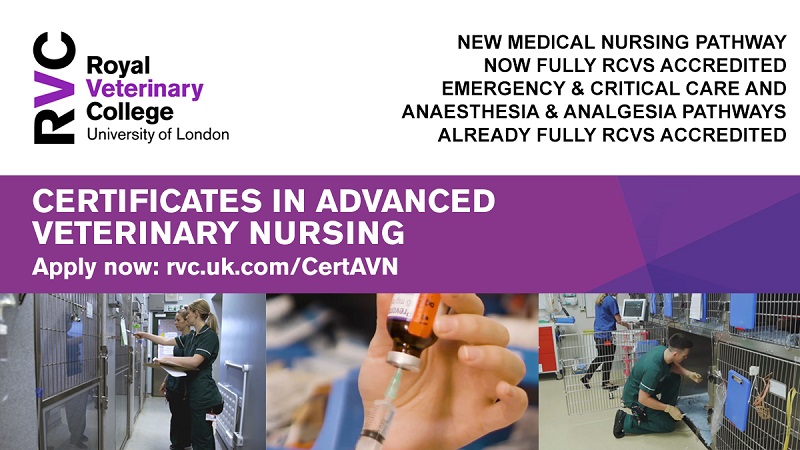Veterinary Nurses Implementing Clinical Audits at the QMHA
Clinical Connections – Autumn 2022
Perdi Welsh, Course Director for post-registration Certificates in Advanced Veterinary Nursing
Clinical governance and associated activities, such as clinical audit to ensure quality enhancement, is now enshrined within the RCVS Codes of Professional Conduct for veterinary surgeons and veterinary nurses.
Clinical governance is an umbrella term encompassing various activities, including evidence-based practice, CPD and clinical audit, all of which ultimately help veterinary professionals make the most informed and appropriate decisions to ensure quality improvement for the care of our patients and services to clients.
Clinical audit is very much part of the clinical governance landscape and can play a hugely important part of the process for reviewing and improving the standard of patient care and clinical practice.
The first cohort of RVNs undertaking the RVC's new RCVS accredited Certificates in Advanced Veterinary Nursing have been making a positive contribution and impact in the QMHA. As part of their studies for their CertAVN programme, students are required to design and carry out a clinical audit on a topic related to the pathway they are studying.
Seven RVNs from the QMHA recently completed the CertAVN, undertaking either the Emergency & Critical Care or the Anaesthesia & Analgesia pathway. Their clinical audit topics ranged from auditing blood transfusion protocols to low flow anaesthesia to reduce carbon footprint, nutrition in ECC patients, hypothermia prevention of patients undergoing MRI and catheter-associated urinary tract infections in neurology patients.

The RVC’s Clinical Governance Officer, Mariah Hashimov, said the auditing process encourages enhanced awareness of familiar activities: “We can often overlook things that form part of our every day – feeding patients, communicating results to clients, recovery times for routine procedures – but how often do we pause to consider what we’re doing, why we’re doing it, what we want to achieve, and how current practice compares to our goals? Part of my role at the RVC is to support RVN’s reflecting and reviewing our day-to-day practice and empower them be a driving force in making impactful changes, no matter how big or small.”
Niamh Clancy, RVN and Module Leader for the Anaesthesia & Analgesia pathway, told Clinical Connections: "It’s great to see RVNs being the driving force for change and evidence-based veterinary medicine in practice, especially in a hospital as large as the QMHA. These RVNs have all chosen completely different aspects of ECC and anaesthesia and their findings will help improve patient care and decrease the hospital’s carbon footprint! I’m looking forward to seeing what these RVNs do in the future with their new-found skills.”
In relation to her experience of carrying out the clinical audit during her studies on the CertAVN in ECC, QMHA RVN Sam McGaw said: “Undertaking a clinical audit enabled me to make a positive impact on the nursing care of ECC patients and improve the workplace culture around nutrition. This was a new experience me for me and was supported by the CertAVN tutors. I look forward to taking an active role in quality improvement and performing more audits at work."
Lyn O’Byrne, RVN and Module Leader for the Emergency & Critical Care pathway, said: “We’re really impressed by the quality and range of subjects our RVNs chose to audit and we’re looking forward to their work being published as part of a drive to share knowledge and disseminate to the wider veterinary community. This is a great example of the way that RVNs can have a meaningful and positive impact on patient welfare and outcome.”
If a governance culture and processes are not in place at your work, maybe it's time to start those discussions to ensure that clinical governance takes priority, and to gather the right people to implement positive change. Although clinical governance requires a whole team approach, RVNs are ideally placed to take leadership in governance processes, and particularly to lead on clinical auditing.
To find out more about the RVC's Certificates in Advanced Veterinary Nursing, click here. Applications close on 5th February 2023.

